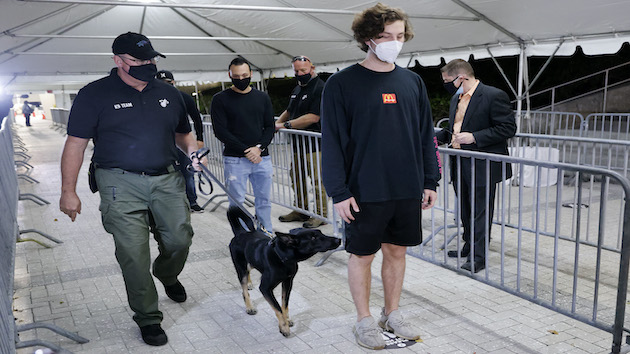 Michael Reaves/Getty ImagesBY: LEIGHTON SCHNEIDER, ABC NEWS
Michael Reaves/Getty ImagesBY: LEIGHTON SCHNEIDER, ABC NEWS
(MIAMI) — In Miami, man’s best friend is now an added layer of defense in the fight against COVID-19.
The Miami Heat have welcomed spectators back to the American Airlines Arena with reduced capacity. But to get inside, fans have to get past one of their COVID-19 detection dogs.
“Right before the metal detectors, as a new step, you line up socially distanced, you put your hands by your side and the dog [walks past] you. If they don’t detect anything, they keep moving. If they do detect, they sit down next to you, which is a gentle gesture to the handler,” Matthew Jafarian, executive vice president of business strategy for the Heat, tells ABC’s Lionel Moise on ABC Audio’s ‘Perspective’ podcast.
He says if the dogs detect a fan has been exposed to the virus, that person and their entire group will be given a refund and sent home with no exceptions.
“[We are] erring on the safe side. If the dog does detect whether the person has already recovered from COVID, and the dog still detects that, we still send them home,” says Jafarian.
The Heat now uses four detection dogs, but there are plans to ramp up to 10 within the next month. For those afraid of dogs, the team is giving the option of a rapid antigen test before entry.
“The dogs are just one step of a larger fan safety plan. We have a really strict mask policy. In fact, we don’t allow any food or beverage inside the arena bowl because we don’t want to provide any reason for somebody to take off their masks,” says Jafarian.
It’s not just sports teams. The nearby Florida International University is using its own team of detection dogs to sniff out COVID-19 in classrooms and public spaces so those areas can be deep cleaned.
“Two of them are purebred, one’s a Dutch shepherd and others a Belgian Malinois, while they look like your typical kind of large police dogs. And the other two are rescue dogs. So they’re mixes of terrier,” Dr. Ken Furton, provost and executive vice president at FIU, tells the ‘Perspective’ podcast.
He spent 25 years researching detector dogs. When the pandemic started they pivoted having their dogs that were initially trained to detect a fungus common on avocado trees learn to detect covid-19 instead.
“Those dogs only take two or three weeks [to] actually to switch over to the new odor,” says Dr. Furton.
FIU partnered with Baptist Health to get used face-coverings of covid positive patients from the hospital.
“[We] essentially shine UV light, ultraviolet light, on those face coverings it kills the virus, but the odor stays there so that it’s a safe training that we can use,” says Dr. Furton.
He says there are two ways the dogs can detect the virus.
“The dogs can either smell directly the virus odor, because the viruses do produce an odor, or they can be detecting the change in the metabolism of a person when they’re infected with the virus,” says Dr. Furton.
He adds well-trained dogs have a high detection rate.
“We can achieve over 90 percent accuracy, which means more than nine times out of ten when the odor is there or a positive mask is there, the dogs alert and they get very few false positives. So they’re very, very accurate, actually more accurate than even PCR testing in the laboratory,” says Dr. Furton.
Both Florida International University and the Miami Heat stress this is just an added layer of security, not a replacement for testing or other safety measures. FIU is now discussing ways to train their dogs on new variants of the virus.
As much of the nation waits their turn to get a vaccine, both groups are now looking at ways they can expand their programs.
“We’ve gotten calls [from] hospitality, from casinos, from airlines, from cruise lines, from high rise buildings to sports teams and leagues, as well,” says Jafarian.
Listen to this story on this week’s ‘Perspective’ podcast:

Copyright © 2021, ABC Audio. All rights reserved.



Comments are closed.